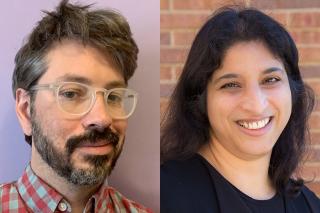"Raw data is useless if you don't have cultural and historical context," says Assistant Teaching Professor of Art and Music Michael Zachary. "Without it, you won't know what the data actually tells you, nor can you communicate it in a meaningful way."
This broader perspective for analyzing data is what Zachary, along with Professor and Chair of Economics Niloufer Sohrabji, aim to share in the Learning Community (LC) "Telling Stories with Data," which they co-teach as part of the undergraduate PLAN curriculum.
A Learning Community brings together faculty from two different disciplines to discuss a topic of interest. Each faculty member teaches a three-credit class in their discipline, and a two-credit seminar is co-taught. Using their expertise, Sohrabji and Zachary each teach data concepts, from a macroeconomic and an individual perspective, which are then brought together in an Integrative Seminar where students interpret datasets to produce compelling narratives. By combining the analytical side of economics with the cultural competencies of the arts sphere, students learn robust skills for communicating data.
"Our goal is to get the students to understand that it can be limiting to just understand some of these big issues from only one point of view," says Sohrabji. "It's not incorrect, but it can be incomplete if you don't approach data analysis from other disciplines as well." The two faculty members want to encourage students to explore other disciplines and fields that contribute to their own understanding. Though both courses in the Learning Community address the stories that data can tell, they approach the subject with radically different methodologies. While Sohrabji offers a lecture, Zachary's class is a studio art class, where students learn through creative making.
"You can be interdisciplinary yourself, but when people come with their passion and expertise from their field, it allows you to see things in a more holistic and comprehensive way," says Sohrabji. "In Economics, you have the data and to make sense of it, you interpret it. What Michael shows us is how to think differently about data. What counts as data? Does it have to be a number? It's that opening of your mind to think of different things."
Social Work and Data Science major Madeleine Guettler '24, appreciated the unique combination. "The class was incredible," says Guettler. "It provided not only an extensive foundation of inequality, sustainability, and injustice, but then gave space in both Economics and Art to discuss how to use data to convince people to make changes and care about issues." Guettler cited the manipulation of shapes and color choices to impact how data is portrayed, and how art installations can bring attention to sustainability and inequality issues. "It gave us the chance to explore how to bring about change in an atypical way that worked to reach a greater audience."
As Guettler mentioned, Zachary uses maps as examples of quantifiable, verifiable information, which use presentation choices to shift perception of the data. "You can tell a very different story depending on how you choose to scale the map, what colors you use, and what data you present first," says Zachary, noting that those choices can exploit biases and influence the story the data is presenting. Students are also asked to consider issues of inclusivity and equity in the data that is collected, and how it is used.
While integrating two seemingly disparate fields - art and economics - may seem complicated at first, Sohrabji and Zachary see tremendous benefits, for the students and themselves. "I'm grateful for the opportunity to work with Niloufer in this structure," says Zachary, also noting that, in teaching his usual classes, "things can become rote if you're treading the same ground, dealing with the same issues, stuck in your own filters. This is a jump into new disciplines, problems I don't know anything about."
Students have also commented on the fluid partnership between the two faculty members. "It's fun to come up with in-class exercises and activities," says Sohrabji, recalling a particular brainstorming session. "Instead of stopping at the first good idea, you have someone to bounce ideas back to you. We had some nice in class exercises that are very useful for students and definitely for us."
Biology student Charlotte Peace '24 saw the Learning Community as a rare opportunity. "It's a great experience for anyone who hasn't fully explored their artistic side," says Peace, "while also having a more structured and data-heavy aspect to it. I would recommend this LC to anyone who is interested in social issues as well the data associated with those issues and looking for new ways to visually understand and present that data."
Zachary sees the tension between the two disciplines as a useful learning experience. "Getting students accustomed to uncertainty is a useful skill," says Zachary. "So much of academia is siloed into right and wrong answers. Because of the way school is structured, we tend to steer into those problems. But outside of school, students will be faced with complicated problems. There is value in getting students comfortable in a space with no right answer, to develop their minds and flex those muscles."

